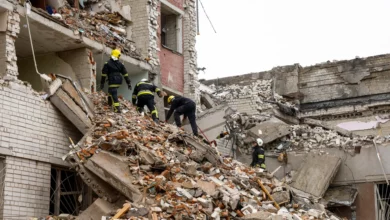Athens–Tens of thousands of strikers marched through Athens on Wednesday to protest against austerity plans aimed at wrenching Greece out of a debt crisis that has shaken the euro zone.
The Socialist government meanwhile hit back at European criticism of Greece’s fiscal management, accusing European Union partners of double standards and poor leadership.
The 24-hour general strike grounded flights and disrupted services but stopped short of bringing Greece to a standstill. Scuffles broke out on the fringe of the protest, with police firing teargas to disperse groups of stone-throwing youths.
"No sacrifices, the rich should pay for the crisis," demonstrators chanted as more than 20,000 marched on parliament in an otherwise peaceful protest.
In a sign of persistent market jitters, Greece’s borrowing costs rose on Wednesday after Czech Finance Minister Eduard Janota said Athens would find it impossible to slash its budget deficit as fast as promised.
Deputy Prime Minister Theodoros Pangalos said Italy, France and Belgium had used the same techniques as Greece to mask their true deficits to qualify for the euro zone.
"You simply put some amounts of money in the next year … it is what everybody did and Greece did it to a lesser extent than Italy for example," Pangalos told BBC World Service radio.
He said Germany was ill-placed to criticize Athens given its behavior during the Nazi occupation of Greece in World War Two, including the looting of central bank gold reserves.
The public and private sector unions, which together represent half of Greece’s workforce of 5 million, want the government to scrap plans to freeze public wage, hike taxes and increase the retirement age.
"Today, Europe’s eyes are turned on us," said Yannis Panagopoulos, head of the private sector union GSEE.
"We ask the government not to give in to the desires of the markets, to set people’s needs as a priority and adopt a mix of economic and social policies that won’t lead to recession but to jobs," he told the rally.
Fitch Ratings on Tuesday downgraded the ratings of Greece’s four largest banks, expecting fiscal tightening to weigh on the economy and loan demand, hurting profits.
The strike coincided with a visit by EU officials assessing whether Greece is on track to cut its double-digit deficit. Greece’s debt crisis has shaken the euro and sent peripheral bond and credit default swaps markets reeling.
"The team of inspectors coming from the Commission, the ECB and the IMF … will get a taste of the dynamic reaction of the Greek workers to the huge pressures from Brussels," center-left Eleftherotypia newspaper wrote in an editorial.
Under the scrutiny of EU policymakers and markets, the government has so far refused to give in to protesters’ demands. Finance Minister George Papaconstantinou said on Tuesday the cabinet may decide on more measures to cut the deficit after talks with the visiting EU officials.
The first joint walkout by the two major labor federations was the biggest test to the government’s resolve since it won October elections. Opinion polls show most Greeks support government efforts to shore up deteriorating public finances that have rattled markets and worried European Union partners.
Workers and employers gave vastly different participation estimates. Government officials said only about 16 percent of public sector workers walked off the job, but public sector union ADEDY put participation at 90 percent.
Most shops in the capital were open, some banks were closed and others empty, and the capital’s chaotic traffic was quieter than usual. The Athens stock exchange operated normally.
All but emergency flights to and from Greece were grounded, ships stayed tied up in dock, and ministries, schools and monuments such as the Athens Acropolis remained shut. Street protests failed to attract more than the usual numbers.
In central Athens some said they saw no reason to strike.
"I don’t want to participate in the strike," 62-year old gas station owner Dimitris Makrivellios said. "Aren’t people also responsible for this situation? Our economy’s problems concern us all. Why should we strike?"
Spanish workers unhappy about plans to raise the retirement age marched on Tuesday but the main protest in Madrid seemed relatively small in a sign that the country’s unions may be weakening.




